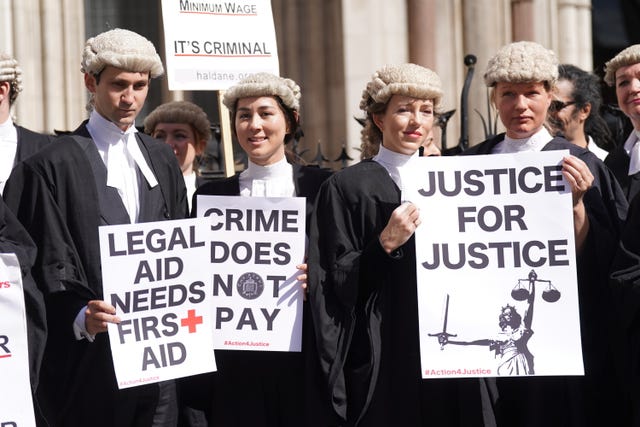Criminal barristers in England and Wales have voted in favour of an all-out strike.
Barristers are currently walking out on alternate weeks but have now opted for an indefinite, uninterrupted strike from September 5.
The escalation of the industrial action, combined with the ongoing arrangement, means the last working day for barristers will be on Friday and they will walk out again from August 30.
The PA news agency looks at the dispute so far.
Members of the Criminal Bar Association (CBA) are embroiled in a row over jobs and Government-set fees for legal aid advocacy work – publicly funded representation for defendants who cannot afford to pay.
Chairman Jo Sidhu QC previously said the action aimed to “shine a spotlight on the severity of the ongoing crisis in the criminal justice system”.
The CBA also claimed the Government had “manifestly failed to recognise the scale of the crisis and to act with the urgency required”.
– How has the strike affected the justice system so far?
According to MoJ figures, more than 6,000 court hearings have been disrupted a result of the dispute so far.
Data released under freedom of information laws show that during the first 19 days of industrial action – between June 27 and August 5 – there were 6,235 court cases disrupted, including 1,415 trials, across England and Wales.

There are around 2,400 full-time criminal barristers and 1,808 CBA members – out of 2,273 who took part in the ballot – voted in favour of escalating the industrial action.
The action has the potential to see the criminal justice system in crown courts grind to a halt. With legal representatives absent from proceedings, few will be able to go ahead. It may mean only the most severe and urgent cases can be prioritised.
As a result of the action, defence barristers are also refusing to step in and pick up court hearings and other work for colleagues whose cases are overrunning – which typically helps to limit delays in the progress of proceedings.
The culmination could further exacerbate the backlog of cases waiting to be dealt with by courts which has grown amid lockdown restrictions brought on by the coronavirus pandemic.
Ultimately, it means victims could be waiting longer for justice and defendants could face delays in their case being concluded.
– Has the Government not offered barristers a pay rise already?
Yes.
Criminal barristers are due to receive a 15% fee rise from the end of September, meaning they will earn £7,000 more per year, the Ministry of Justice (MoJ) said.
But there has been anger among lawyers that the proposed pay rise will not be made effective immediately and will only apply to new cases, not those already sitting in the backlog waiting to be dealt with by courts.
The MoJ previously said it had “repeatedly explained” to the CBA that backdating pay would require a “fundamental change” in how fees are paid, adding: “That reform would cost a disproportionate amount of taxpayers’ money and would take longer to implement, meaning barristers would have to wait longer for payment.”
– What is the Government’s position?
Ministers and officials have branded the decision “irresponsible” and warned the action will cause “unnecessary disruption” which will only see more victims face further delays and distress while they wait for their cases to be dealt with by courts.
Downing Street has urged the CBA to rethink its plans.
In making the pay offer, the Government agreed to match recommendations made by Sir Christopher Bellamy QC, who carried out a review of the legal aid system, by increasing investment in criminal legal aid by £135 million a year, including an increase in fees for criminal barristers.
But his report also warned the sum was the “minimum necessary as the first step in nursing the system of criminal legal aid back to health after years of neglect”, adding: “I do not see that sum as ‘an opening bid’ but rather what is needed, as soon as practicable, to enable … the whole criminal justice system to function effectively, to respond to forecast increased demand, and to reduce the backlog.
“I by no means exclude that further sums may be necessary in the future to meet these public interest objectives. There is in my view no scope for further delay.”






